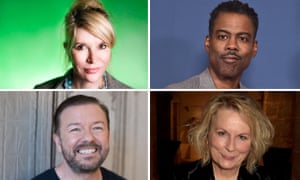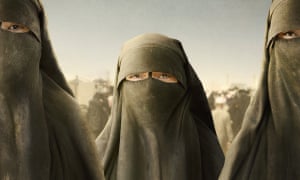Cancel culture killing comedy? What a joke
Chris Rock, Jennifer Saunders and more have argued that ‘wokeness’ is stifling comedy. But the idea of the joke police is actually nonsense

Is cancel culture destroying comedy? A lot of comedians seem to think so. John Cleese has fretted that “wokeness” will “stifle creativity”. Chris Rock attributed all the “unfunny TV shows” he sees to the fact that “everybody’s scared to make a move”. Shappi Khorsandi wrote: “The fear of being ‘cancelled’ is real and it will be the death of standup comedy as we know it.”
When Dawn French was asked on Times Radio if she felt cancel culture was “imaginatively restrictive”, she said: “One hundred per cent yes,” before expressing concern about how a comic couldn’t do “edgy” material these days “because you’d just have so many haters on your back”. Ricky Gervais – also on Times Radio – said the BBC had become “more and more careful” and nowadays “would worry about some of the jokes” in The Office. Inbetweeners star James Buckley has said fear of causing offence was “killing comedy … there seems to be a joke police”.
In June, Jennifer Saunders’s comments on the matter made headlines in the likes of Mail Online (“Jennifer Saunders says Absolutely Fabulous wouldn’t be commissioned today in Britain’s ‘woke’ culture”). The closest Saunders had come to saying that was the vague assertion that people “talk themselves out of stuff now because everything is sensitive”. But in the past, she has been more direct. “People are so politically correct now,” she told PA Media in 2017. “You can’t even get away [with doing] a politically incorrect character, because that is seen as being politically incorrect.”
It’s starting to sound like a chorus – and the idea that so-called cancel culture is killing comedy is in danger of becoming received wisdom (being “cancelled” encompasses everything from criticism by a handful of social media users to being fired from your job and shunned by society). Actual examples of it happening, however, are thin on the ground – as are coherent arguments. “Apparently, comedians are scared to say anything for fear of cancellation,” wrote the standup Robin Ince recently. “I don’t know who these comedians are and I don’t know what they are too scared to say.”
The anxiety may be a nebulous one, but it clearly exists. It makes a certain amount of sense: comedy is a pressure valve, a brief, blissful release from everyday challenges and existential dread. It relies on shock, subversion and a little bit of transgression to fulfil an important social function. How could it do so if it were only permitted to parrot the views approved by a mysterious, vocal minority – the “haters”, the “joke police” – on Twitter? It couldn’t. That wouldn’t be comedy at all.
The good news is: it isn’t. If all the aforementioned comedians know that cancel culture is stifling comedy because they are effectively censoring themselves, they can stop now. In the vast majority of cases, people who make jokes that are considered offensive in the broadest possible terms face zero repercussions – in fact, they tend to thrive. Jimmy Carr was still making jokes about dwarfism, lesbians and Gypsies in his 2019 tour show. How has society punished him? By giving him a series of increasingly prominent TV gigs (most recently as a judge on the BBC’s Saturday night show I Can See Your Voice). Dave Chappelle faced criticism for material about trans people, Chinese people, and child abuse in his 2019 standup show, Sticks & Stones. Was he shunned? No, he was awarded the Grammy for best comedy album. Did Bill Burr face disgrace after his SNL monologue was deemed misogynistic and homophobic online? No, he is currently working on the fifth series of his Netflix animation F Is For Family and has a series of high-profile film roles in the pipeline.
Widespread online criticism of a joke deemed offensive almost never leads to any actual consequences. Very occasionally, in very extreme cases, there is some pushback. In July, the standup Andrew Lawrence was dropped by his agent and had gigs cancelled after tweeting racist remarks (it would be a stretch to call them jokes) about the footballers who missed penalties at the Euro 2020 final. Last year, the comedian Sarah Silverman claimed she was dropped from a film after an old sketch in which she wore blackface resurfaced online. But that seems an unusual repercussion: Jimmy Kimmel, Jimmy Fallon and Tina Fey have all apologised for the use of blackface in their work with no impact on their careers. Last year, Channel 4 removed Bo’ Selecta! from its streaming service for its use of blackface – but its creator Leigh Francis’s long-running gameshow Celebrity Juice (which has itself been called misogynistic) still returned in April. Around the same time, Little Britain was removed from iPlayer for its use of blackface and yellowface. In light of a public reckoning in the press, the careers of creators Matt Lucas and David Walliams have gone from strength to strength – the pair even reprised controversial Little Britain characters including Vicky Pollard and Lou and Andy for the BBC’s pandemic charity show The Big Night In.
When you get down to it, the argument that cancel culture is killing comedy dissolves into nothingness. Last month, the Scotsman’s comedy critic Kate Copstick fronted a Radio 4 documentary called Taboo, premised on her fear of “a deepening quicksand of prescription in which the art and the craft of comedy is arguably sinking”. After 30 minutes of discussion with a roster of comedians – a conversation that never came remotely close to identifying any of the technicalities of that argument – she was forced to conclude: “There is no great woke conspiracy to cancel comedians.”
Meanwhile, during a debate on ITV’s Good Morning Britain about wokeism in comedy, co-host Adil Ray (who said on the show that his sitcom Citizen Khan wouldn’t be made today … then revealed he was in talks to revive it) struggled to sum up why Ab Fab would no longer be looked upon favourably. It wasn’t to do with it featuring anything “homophobic or racist”, he said, but because it relied on “stereotypes … portraying women in a negative way”. The Telegraph attributed it to a combination of smoking, bad parenting and fat-shaming.
In fact, portraying women as deeply flawed, deeply ridiculous and sometimes just horrible fuels much modern TV comedy. Poor parenting – and reluctant mothering – is another rich comic seam that is being increasingly exploited. If the “wokeism is killing comedy” crew are motivated by a genuine devotion to great comedy, then they can relax, because it is in rude health when it comes to risk-taking, boundary-pushing content.
Mainstream comedy has never been so scatalogically gross-out or sexually explicit, or tackled taboos with such gusto. Like gags about masturbation? Try I Hate Suzie or Fleabag. Into comedy that returns continually to the topic of incestuous paedophilia? Try Julia Davis’s hit podcast Dear Joan and Jericha. Want jokes that revolve around parenting a disabled child? There She Goes. A sitcom about a person with a disability? Jerk. Gender identity? Feel Good. Racism? Dreaming Whilst Black. If you want to see straight white men merrily busting taboos, you’ve got South Park, Curb Your Enthusiasm or It’s Always Sunny in Philadelphia.
Scaremongering about progressive politics leading to the destruction of comedy is nothing new. Howard Jacobson was protesting against “this latest insistence on correct attitudes to social and sexual matters in jokes” in his 1997 book Seriously Funny. In 1995, The Independent was writing about the “tired, boring, repetitive, unfunny PC rubbish known as alternative comedy”, while the Daily Mail claimed that Ben Elton’s audience only wanted “cliched, progressive, political correctness dressed up as daring satire”.
In fact, as Gervais has pointed out, the opposite is true: “PC culture isn’t killing comedy. It’s driving it. As it always did,” he tweeted in 2019. This is true in a straightforward sense – the alternative comedy scene in which French and Saunders made their name was a leftwing rebellion against the sexist and racist tropes that characterised 70s standup – as well as a more layered one. Increased social sensitivity means increased social tension – and increased opportunities to relieve that tension with comedy, which is why Larry David wearing a Maga cap in the last series of Curb Your Enthusiasm was so funny. People trying to negotiate political correctness badly while simultaneously using it cynically to advance their own position might sound like a modern malady, but it’s actually what connects David Brent with Rick from The Young Ones.
The concept of cancel culture destroying comedy makes most sense if viewed as part of a much broader political campaign against progressive politics. “The argument that comedy at the BBC has been taken over by the leftwing was fabricated systematically by the Telegraph,” said Stewart Lee in an interview this year, commenting on the largely unfounded media speculation that the incoming BBC director general, Tim Davie, wanted to wage a war on “woke” comedy. In that context actual comedy is merely a stooge, its robustness entirely irrelevant, and rushing to its defence is simply a clever trick, a way to co-opt something precious to British people from all political persuasions.
For the comedians themselves, their outlook is understandable on a human level: being sensitive to other people’s feelings all the time can be hard and stressful, and getting criticised on social media for offending people is never much fun. But social media criticism is rarely a tool of oppression – it’s an occupational hazard in many professions, and it doesn’t destroy them. The idea that cancel culture is killing comedy is a nonsense slogan – an absurdist joke in itself.



